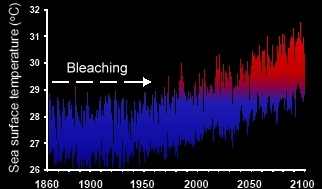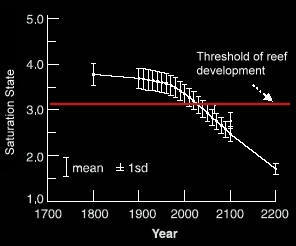|
 Global
changes in the Earth's climate and chemistry of the ocean
threaten to further stress coral reefs at a time
when they are already declining due to local and
regional stressors including high nutrient and
sediment loading; unsustainable harvesting of
fish, corals and other reef organisms; and,
physical damage from boats, diving and
destructive fishing practices. While reefs have
survived large fluctuations in climate during
their 200 million years on earth there were mass
extinction events and long periods of time when
reefs were much less extensive than they are
today. We may be heading toward such a period
now. The question that needs to be asked is,
"should we try to do something about it?" Much
is at stake. Coral reefs provide ecological
services worth many billions of dollars in the
form of habitat for valuable fisheries, natural
protection from shoreline erosion, potential
source of new medicines and biomedical, and recreation. Coral
reefs contribute over one billion dollars each
year to the economy of south Florida alone. The
global nature of greenhouse warming and the
acidification of the ocean means that coral reef
preservation and restoration efforts based on
the creation of marine protected areas (MPAs)
may not be effective because the encroachment of
warm, acidic water will not respect park
boundaries. If we want to protect coral reefs
from the threats of global change we will need
to get serious about cutting the emissions of
carbon dioxide that are creating the threat. Global
changes in the Earth's climate and chemistry of the ocean
threaten to further stress coral reefs at a time
when they are already declining due to local and
regional stressors including high nutrient and
sediment loading; unsustainable harvesting of
fish, corals and other reef organisms; and,
physical damage from boats, diving and
destructive fishing practices. While reefs have
survived large fluctuations in climate during
their 200 million years on earth there were mass
extinction events and long periods of time when
reefs were much less extensive than they are
today. We may be heading toward such a period
now. The question that needs to be asked is,
"should we try to do something about it?" Much
is at stake. Coral reefs provide ecological
services worth many billions of dollars in the
form of habitat for valuable fisheries, natural
protection from shoreline erosion, potential
source of new medicines and biomedical, and recreation. Coral
reefs contribute over one billion dollars each
year to the economy of south Florida alone. The
global nature of greenhouse warming and the
acidification of the ocean means that coral reef
preservation and restoration efforts based on
the creation of marine protected areas (MPAs)
may not be effective because the encroachment of
warm, acidic water will not respect park
boundaries. If we want to protect coral reefs
from the threats of global change we will need
to get serious about cutting the emissions of
carbon dioxide that are creating the threat.
NCORE's global
change initiative will focus on understanding
the science behind the effects of rising
temperature and falling pH on corals and other
reef organisms. Studies will include analysis
of the geological record, geochemistry of corals
and forams, short and long term micro- and
mesocosm studies, field based observations and
manipulations.
Langdon, C., and M.J.
Atkinson. 2005.
Effect of
elevated pCO2 on photosynthesis and
calcification of corals and interactions with
seasonal change in temperature/ irradiance and
nutrient enrichment,
J. Geophysical
Res., 110, C09S07,
doi:10.1029/2004JC002576.
Langdon, C.
Effect of elevated CO2
on the cycling of organic and inorganic carbon
on coral reefs.
(OCCC meeting presentation, 1-4 Aug 2005,
Woodshole, MA).
|
|
Greenhouse warming and ocean
acidification threaten to push corals beyond their environmental limits
within the next 50-100 years.

A: Sea surface temperatures are trending to levels that will regularly
exceed the bleaching threshold of many coral species (Hoegh-Gulberg, O.,
in press).

B: Ocean acidification is
driving down the saturation state of seawater. This parameter controls
the calcification rate of corals. If the trend continues, a threshold
may be crossed where corals will no longer be able to calcify quickly
enough to build corals (Kleypass, J.A., et al, 1999).
References
Hoegh-Guldberg,
O., Low coral cover in a high-CO2
world, J.
Geophysical Res., in press.
Kleypas, J.A.,
R.R. Buddemeier, D. Archer, J.P. Gattuso, C.
Langdon, and B.N. Opdyke, Geochemical
consequences of increased atmospheric CO2
on corals and coral reefs,
Science,
284,
118-120, 1999.
|
|
